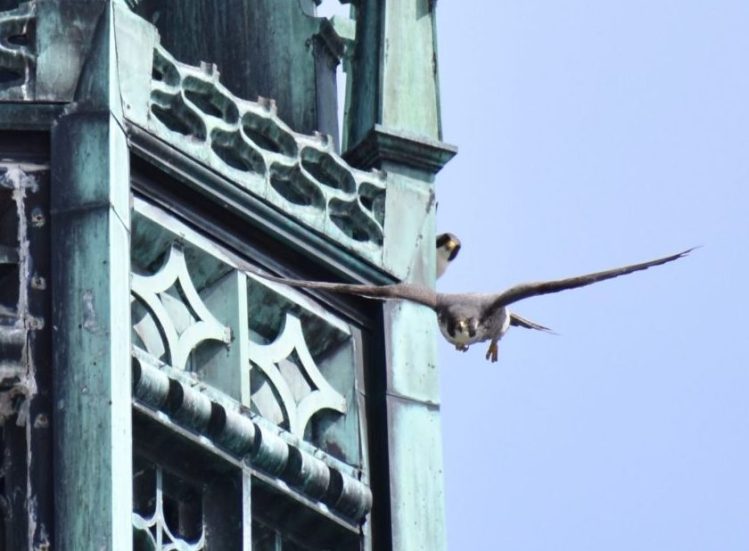ACADIA NAT’L PARK — It is not very far from Acadia to Lewiston as the crow – or, in this case, the peregrine falcon – flies. So, it is not too surprising that a peregrine that hatched and fledged here two years ago now has a nest at the Franco-American Heritage Center.
But it is one more good sign for Maine’s breeding peregrine population, which is still listed as endangered by the state.
The peregrine that found its way to Lewiston has been named Lizzie by Patricia Berube, a volunteer peregrine observer there. Lizzie was one of four chicks that were banded by Acadia wildlife biologists on May 31, 2018, at a cliffside nest at Valley Cove.
Peregrine falcons had disappeared from the eastern United States by the early 1960s because of the widespread use of the insecticide DDT, which caused a thinning of their eggshells that kept the chicks from developing. The federal government banned the agricultural use of DDT in 1972. Peregrine falcons began to be reintroduced in Maine, including Acadia, in the mid-1980s.
A survey conducted last year by the Maine Department of Inland Fisheries & Wildlife documented 38 pairs of falcons in the state and confirmed that 23 of those were breeding.
“Breeding pairs are often associated with their territory year-round, and their young disburse throughout Maine and the Northeast,” said IF&W raptor specialist Erynn Call. “So, it’s not surprising at all that the bird that was banded in Acadia is breeding in Lewiston.”
That bird, Lizzie, and its mate, dubbed Chester, are exhibiting nesting behaviors.
“Thanks to a lot of observation time put in by (Berube), we know they are doing incubation switches,” Call said. “One bird comes in and the other bird leaves. We have not had visual confirmation of eggs or chicks at this point, so it’s just that behavior from which we can infer that they are attempting to nest.”
That is the good news. What is problematic is the location of the nest. It is on the side of the steeple of the former St. Mary’s Catholic Church, which is now the Franco-American Heritage Center.
Multiple pairs of peregrines have nested there over the years, starting in 2003. But according to Call, 2009 is the only year in which chicks are known to have fledged there.
“Often, urban falcons have a hard time finding the correct surface to lay their eggs and have them hatch,” she said. “They will lay them on metal or concrete surfaces, and the eggs become too hot, too cold or too wet.
“The reproductive record in Lewiston is probably one of the worst among the reestablished peregrine populations in Maine.”
The location with the best record of successful breeding in Maine is the Dragon Cement Company plant in Thomaston.
“They are superstars of the whole state,” Call said. “Last year they fledged four young, and this year they had the first confirmed hatch. (Dragon officials) are so happy to have them there. Since they have been there for the past 10 years or so, they have not had to hire a pest control service to control pigeons.”
Despite Lizzie’s apparently poor choice of a place to try to raise chicks, Acadia wildlife biologist Bik Wheeler said, “It’s great to see what this individual falcon is doing, and it shows us a little bit more of what the process of [species] recovery can look like. It’s also neat to see the role that Acadia’s peregrine territories are playing in the recovery.”
Asked how Acadia personnel can attach bands to the legs of falcon chicks without being attacked by the parents, Wheeler said, “Quickly and with lots of experience. We’ve learned now to avoid that by the way we approach the nest.”
Using a spotting scope, Berube, the volunteer falcon observer in Lewiston, was able to see the identification band on Lizzie’s leg, which showed that she had hatched in Acadia.
The 2020 survey of Maine’s breeding peregrine population is currently underway. Call said anyone who is interested in taking part may contact her at erynn.call@maine.gov. Monitoring efforts are a collaboration of several state and federal agencies, as well as private landowners and companies.
Donations to The Little Egg Foundation support peregrine research and conservation in Maine, as do the chickadee tax checkoff, the loon license plate and the Maine Birder Band.
Send questions/comments to the editors.



Comments are no longer available on this story